Evidence-Based Medicine Report on ADHD Patient Treatment Options
VerifiedAdded on 2021/01/03
|8
|1489
|89
Report
AI Summary
This report presents an evidence-based medicine analysis of a patient with Attention Deficit Hyperactivity Disorder (ADHD). The report utilizes the PICO framework (Patient, Intervention, Comparison, Outcome) to address the patient's health problem, focusing on the father's suggestion of Omega-3 fatty acids (DHA and EPA) to improve the patient's behavior and attention. The main body includes a critical appraisal of the evidence, emphasizing the benefits of DHA over EPA based on research findings and p-values. Recommendations are provided for the patient, advocating for DHA supplementation, proper diagnosis, and therapies such as cognitive-behavioral therapy and social skills groups. The conclusion reiterates the application of evidence-based practices in healthcare, the use of primary sources and the PICO model, and the effectiveness of DHA for the patient's condition, referencing relevant studies and journals.
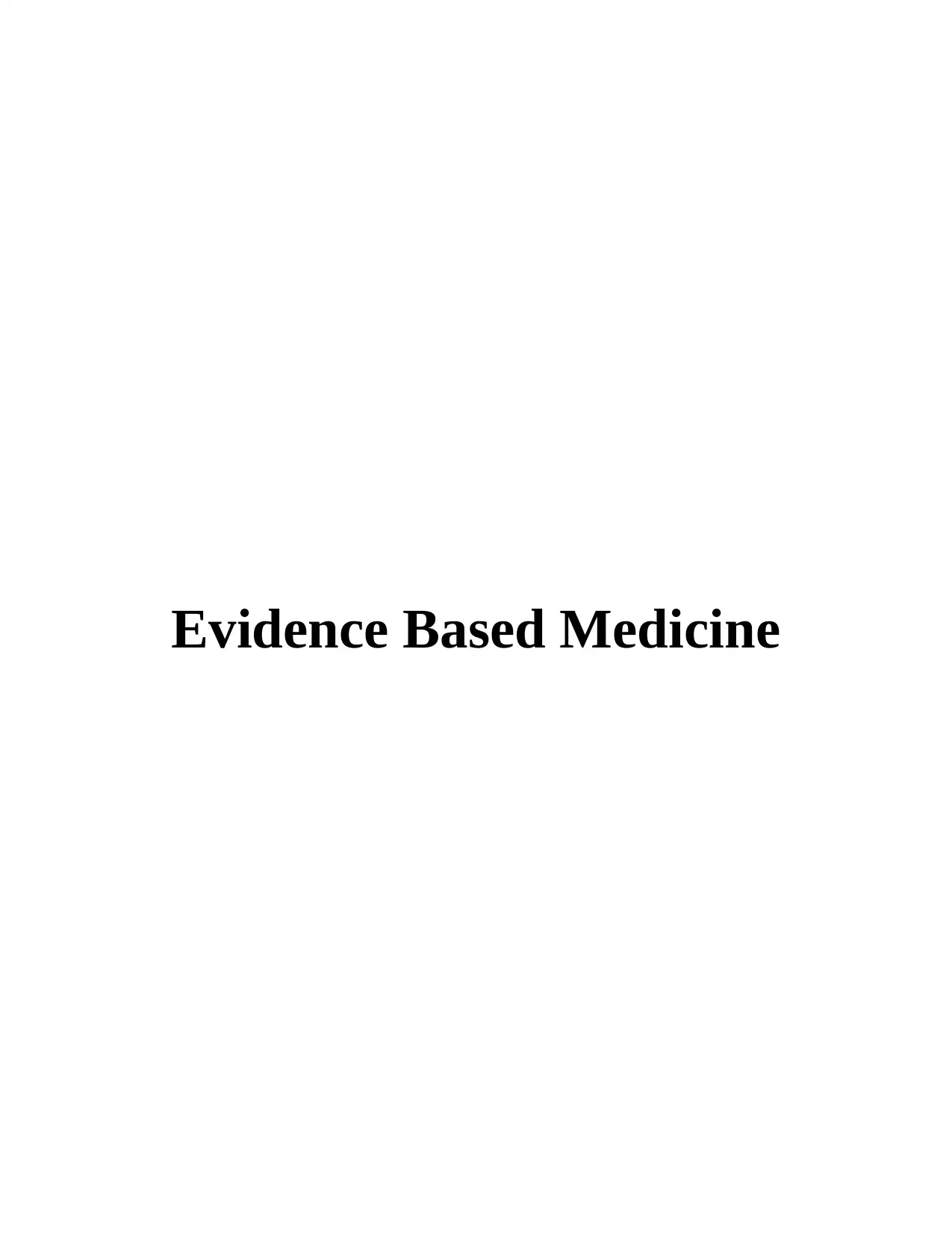
Evidence Based Medicine
Paraphrase This Document
Need a fresh take? Get an instant paraphrase of this document with our AI Paraphraser
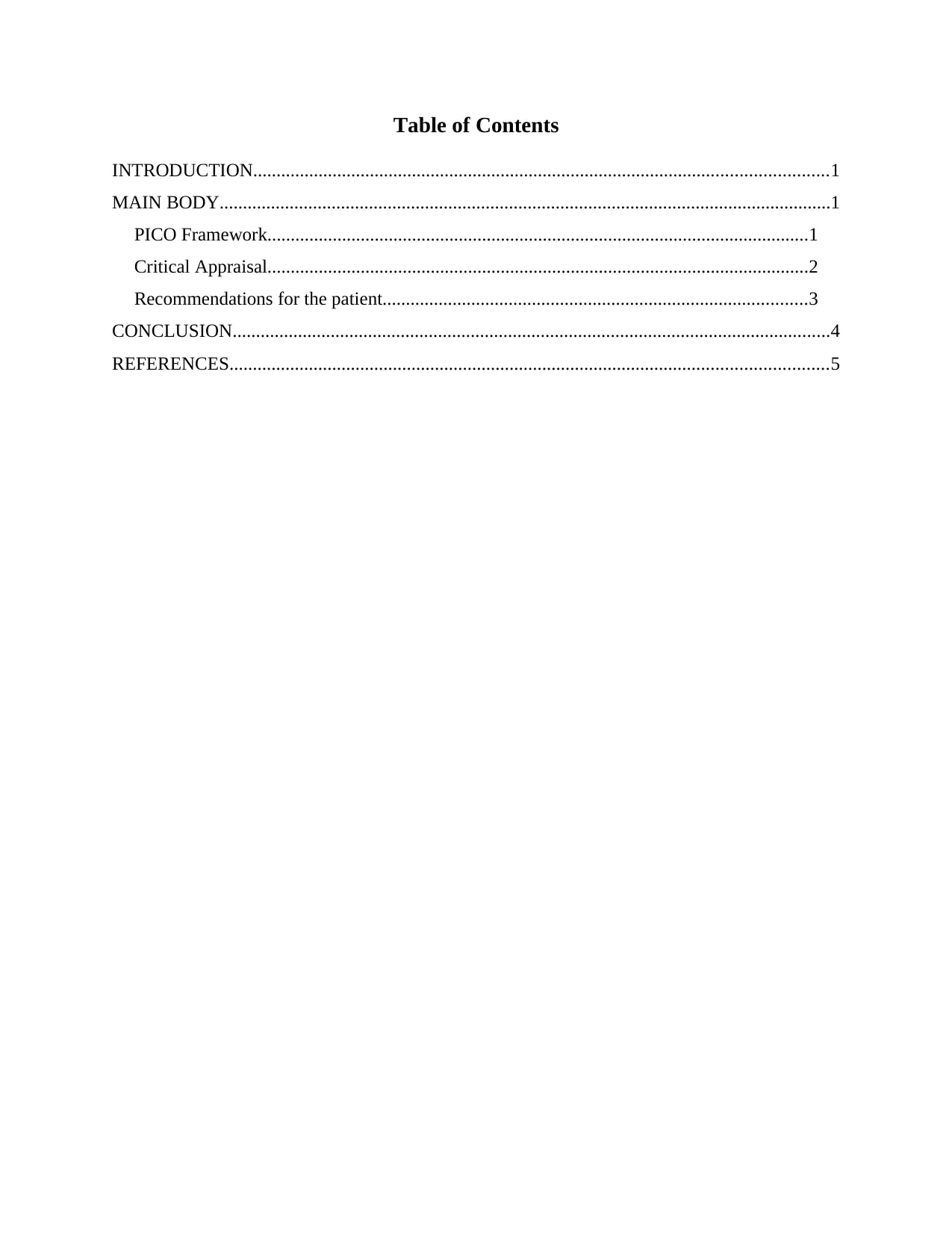
Table of Contents
INTRODUCTION...........................................................................................................................1
MAIN BODY...................................................................................................................................1
PICO Framework....................................................................................................................1
Critical Appraisal....................................................................................................................2
Recommendations for the patient...........................................................................................3
CONCLUSION................................................................................................................................4
REFERENCES................................................................................................................................5
INTRODUCTION...........................................................................................................................1
MAIN BODY...................................................................................................................................1
PICO Framework....................................................................................................................1
Critical Appraisal....................................................................................................................2
Recommendations for the patient...........................................................................................3
CONCLUSION................................................................................................................................4
REFERENCES................................................................................................................................5

⊘ This is a preview!⊘
Do you want full access?
Subscribe today to unlock all pages.

Trusted by 1+ million students worldwide
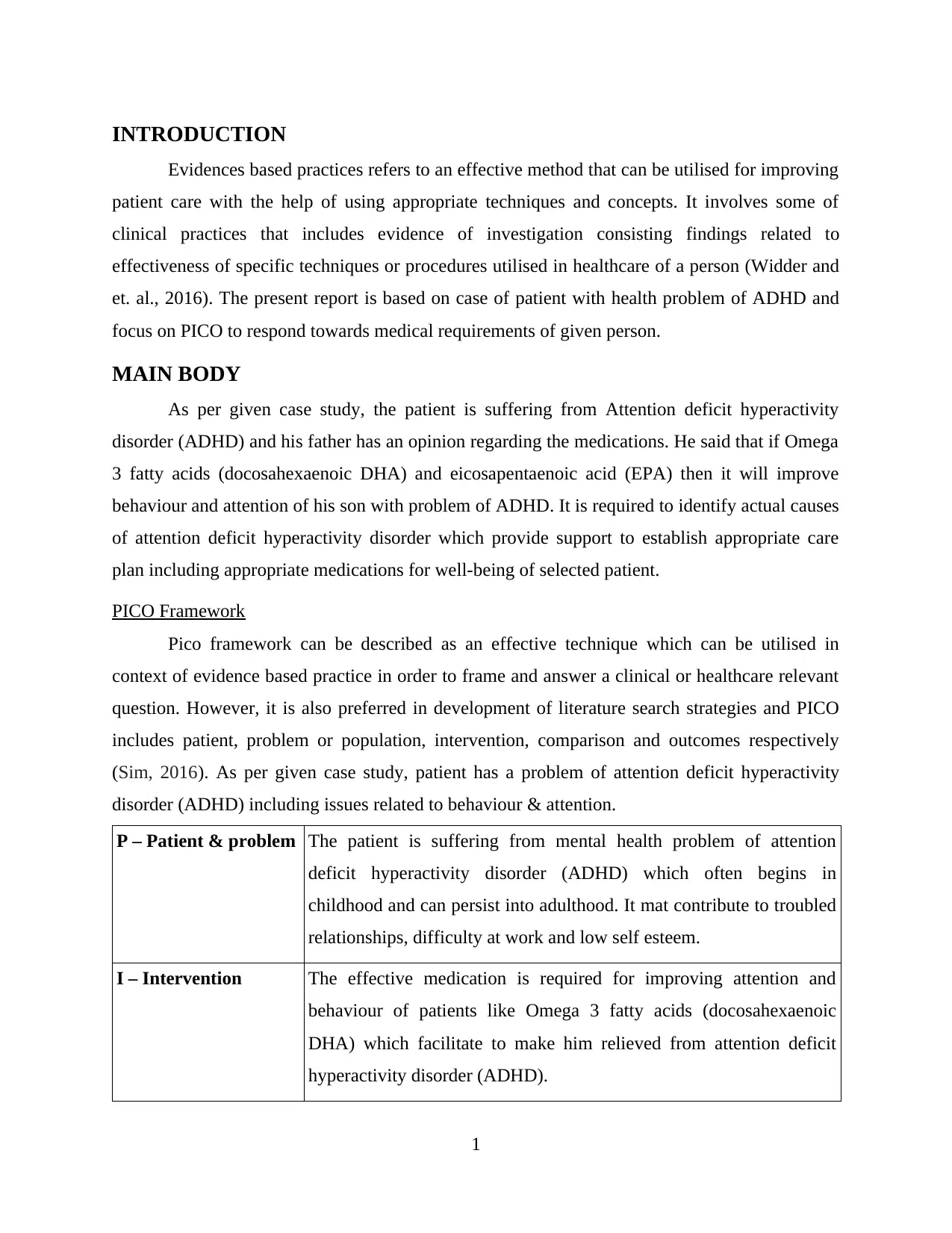
INTRODUCTION
Evidences based practices refers to an effective method that can be utilised for improving
patient care with the help of using appropriate techniques and concepts. It involves some of
clinical practices that includes evidence of investigation consisting findings related to
effectiveness of specific techniques or procedures utilised in healthcare of a person (Widder and
et. al., 2016). The present report is based on case of patient with health problem of ADHD and
focus on PICO to respond towards medical requirements of given person.
MAIN BODY
As per given case study, the patient is suffering from Attention deficit hyperactivity
disorder (ADHD) and his father has an opinion regarding the medications. He said that if Omega
3 fatty acids (docosahexaenoic DHA) and eicosapentaenoic acid (EPA) then it will improve
behaviour and attention of his son with problem of ADHD. It is required to identify actual causes
of attention deficit hyperactivity disorder which provide support to establish appropriate care
plan including appropriate medications for well-being of selected patient.
PICO Framework
Pico framework can be described as an effective technique which can be utilised in
context of evidence based practice in order to frame and answer a clinical or healthcare relevant
question. However, it is also preferred in development of literature search strategies and PICO
includes patient, problem or population, intervention, comparison and outcomes respectively
(Sim, 2016). As per given case study, patient has a problem of attention deficit hyperactivity
disorder (ADHD) including issues related to behaviour & attention.
P – Patient & problem The patient is suffering from mental health problem of attention
deficit hyperactivity disorder (ADHD) which often begins in
childhood and can persist into adulthood. It mat contribute to troubled
relationships, difficulty at work and low self esteem.
I – Intervention The effective medication is required for improving attention and
behaviour of patients like Omega 3 fatty acids (docosahexaenoic
DHA) which facilitate to make him relieved from attention deficit
hyperactivity disorder (ADHD).
1
Evidences based practices refers to an effective method that can be utilised for improving
patient care with the help of using appropriate techniques and concepts. It involves some of
clinical practices that includes evidence of investigation consisting findings related to
effectiveness of specific techniques or procedures utilised in healthcare of a person (Widder and
et. al., 2016). The present report is based on case of patient with health problem of ADHD and
focus on PICO to respond towards medical requirements of given person.
MAIN BODY
As per given case study, the patient is suffering from Attention deficit hyperactivity
disorder (ADHD) and his father has an opinion regarding the medications. He said that if Omega
3 fatty acids (docosahexaenoic DHA) and eicosapentaenoic acid (EPA) then it will improve
behaviour and attention of his son with problem of ADHD. It is required to identify actual causes
of attention deficit hyperactivity disorder which provide support to establish appropriate care
plan including appropriate medications for well-being of selected patient.
PICO Framework
Pico framework can be described as an effective technique which can be utilised in
context of evidence based practice in order to frame and answer a clinical or healthcare relevant
question. However, it is also preferred in development of literature search strategies and PICO
includes patient, problem or population, intervention, comparison and outcomes respectively
(Sim, 2016). As per given case study, patient has a problem of attention deficit hyperactivity
disorder (ADHD) including issues related to behaviour & attention.
P – Patient & problem The patient is suffering from mental health problem of attention
deficit hyperactivity disorder (ADHD) which often begins in
childhood and can persist into adulthood. It mat contribute to troubled
relationships, difficulty at work and low self esteem.
I – Intervention The effective medication is required for improving attention and
behaviour of patients like Omega 3 fatty acids (docosahexaenoic
DHA) which facilitate to make him relieved from attention deficit
hyperactivity disorder (ADHD).
1
Paraphrase This Document
Need a fresh take? Get an instant paraphrase of this document with our AI Paraphraser
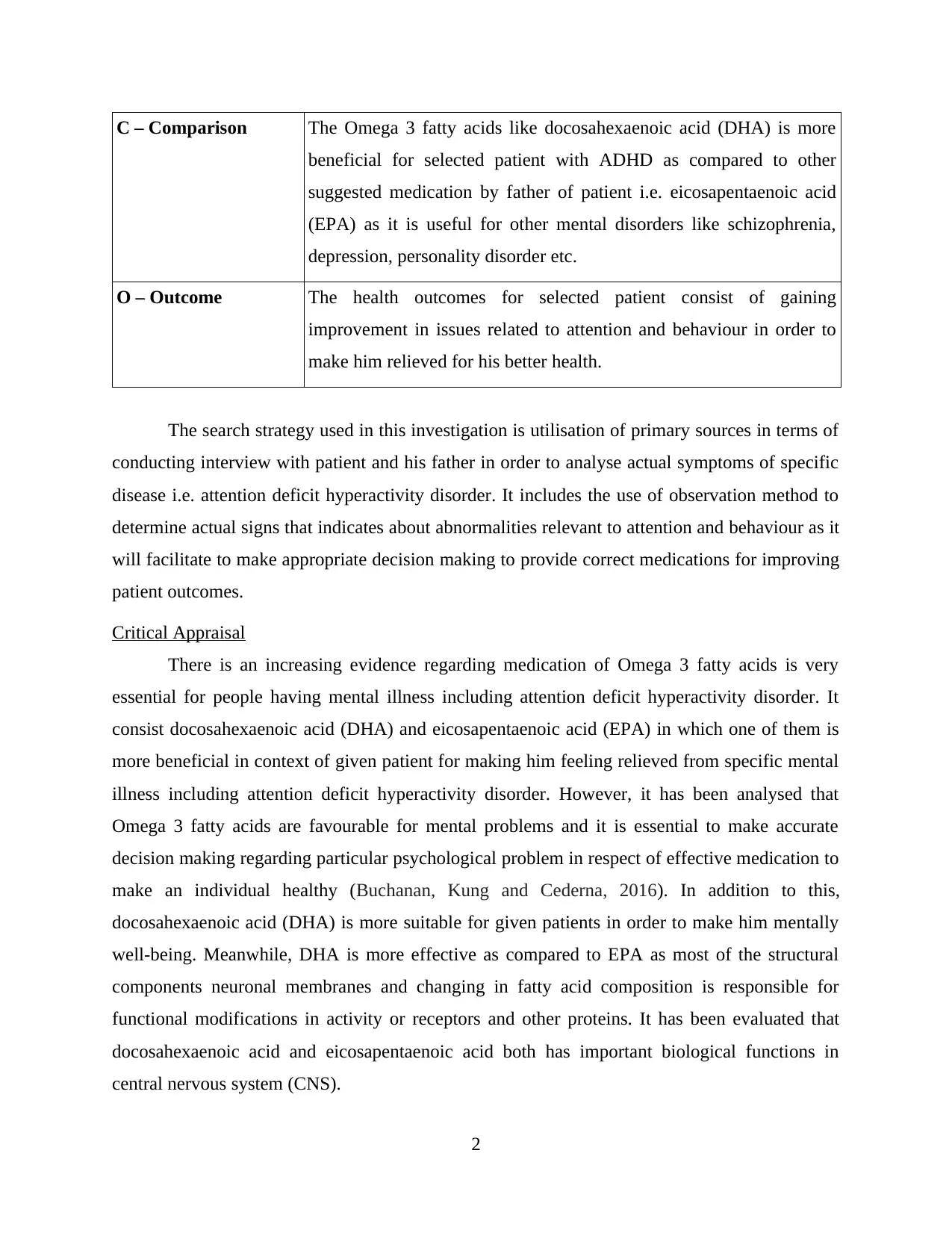
C – Comparison The Omega 3 fatty acids like docosahexaenoic acid (DHA) is more
beneficial for selected patient with ADHD as compared to other
suggested medication by father of patient i.e. eicosapentaenoic acid
(EPA) as it is useful for other mental disorders like schizophrenia,
depression, personality disorder etc.
O – Outcome The health outcomes for selected patient consist of gaining
improvement in issues related to attention and behaviour in order to
make him relieved for his better health.
The search strategy used in this investigation is utilisation of primary sources in terms of
conducting interview with patient and his father in order to analyse actual symptoms of specific
disease i.e. attention deficit hyperactivity disorder. It includes the use of observation method to
determine actual signs that indicates about abnormalities relevant to attention and behaviour as it
will facilitate to make appropriate decision making to provide correct medications for improving
patient outcomes.
Critical Appraisal
There is an increasing evidence regarding medication of Omega 3 fatty acids is very
essential for people having mental illness including attention deficit hyperactivity disorder. It
consist docosahexaenoic acid (DHA) and eicosapentaenoic acid (EPA) in which one of them is
more beneficial in context of given patient for making him feeling relieved from specific mental
illness including attention deficit hyperactivity disorder. However, it has been analysed that
Omega 3 fatty acids are favourable for mental problems and it is essential to make accurate
decision making regarding particular psychological problem in respect of effective medication to
make an individual healthy (Buchanan, Kung and Cederna, 2016). In addition to this,
docosahexaenoic acid (DHA) is more suitable for given patients in order to make him mentally
well-being. Meanwhile, DHA is more effective as compared to EPA as most of the structural
components neuronal membranes and changing in fatty acid composition is responsible for
functional modifications in activity or receptors and other proteins. It has been evaluated that
docosahexaenoic acid and eicosapentaenoic acid both has important biological functions in
central nervous system (CNS).
2
beneficial for selected patient with ADHD as compared to other
suggested medication by father of patient i.e. eicosapentaenoic acid
(EPA) as it is useful for other mental disorders like schizophrenia,
depression, personality disorder etc.
O – Outcome The health outcomes for selected patient consist of gaining
improvement in issues related to attention and behaviour in order to
make him relieved for his better health.
The search strategy used in this investigation is utilisation of primary sources in terms of
conducting interview with patient and his father in order to analyse actual symptoms of specific
disease i.e. attention deficit hyperactivity disorder. It includes the use of observation method to
determine actual signs that indicates about abnormalities relevant to attention and behaviour as it
will facilitate to make appropriate decision making to provide correct medications for improving
patient outcomes.
Critical Appraisal
There is an increasing evidence regarding medication of Omega 3 fatty acids is very
essential for people having mental illness including attention deficit hyperactivity disorder. It
consist docosahexaenoic acid (DHA) and eicosapentaenoic acid (EPA) in which one of them is
more beneficial in context of given patient for making him feeling relieved from specific mental
illness including attention deficit hyperactivity disorder. However, it has been analysed that
Omega 3 fatty acids are favourable for mental problems and it is essential to make accurate
decision making regarding particular psychological problem in respect of effective medication to
make an individual healthy (Buchanan, Kung and Cederna, 2016). In addition to this,
docosahexaenoic acid (DHA) is more suitable for given patients in order to make him mentally
well-being. Meanwhile, DHA is more effective as compared to EPA as most of the structural
components neuronal membranes and changing in fatty acid composition is responsible for
functional modifications in activity or receptors and other proteins. It has been evaluated that
docosahexaenoic acid and eicosapentaenoic acid both has important biological functions in
central nervous system (CNS).
2
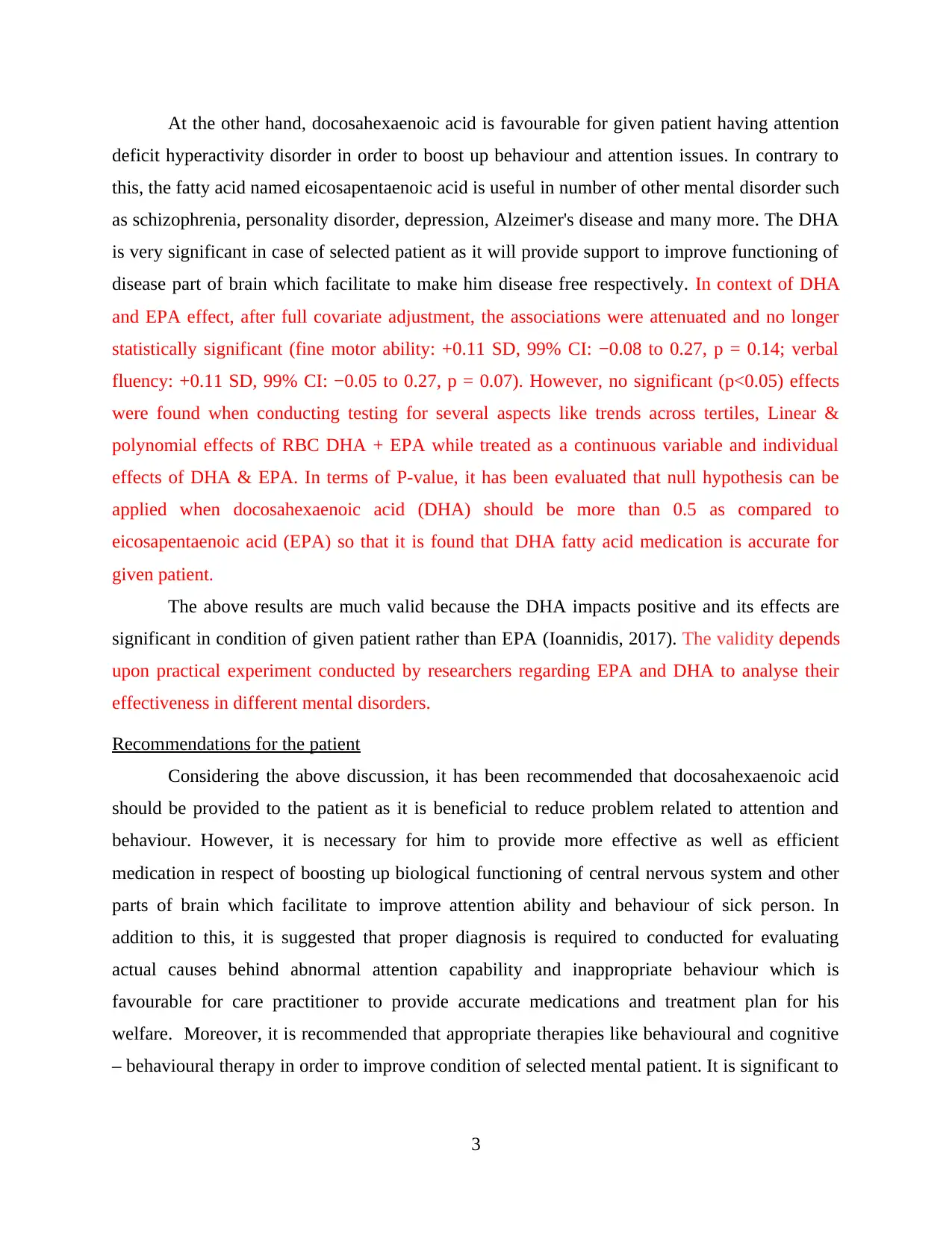
At the other hand, docosahexaenoic acid is favourable for given patient having attention
deficit hyperactivity disorder in order to boost up behaviour and attention issues. In contrary to
this, the fatty acid named eicosapentaenoic acid is useful in number of other mental disorder such
as schizophrenia, personality disorder, depression, Alzeimer's disease and many more. The DHA
is very significant in case of selected patient as it will provide support to improve functioning of
disease part of brain which facilitate to make him disease free respectively. In context of DHA
and EPA effect, after full covariate adjustment, the associations were attenuated and no longer
statistically significant (fine motor ability: +0.11 SD, 99% CI: −0.08 to 0.27, p = 0.14; verbal
fluency: +0.11 SD, 99% CI: −0.05 to 0.27, p = 0.07). However, no significant (p<0.05) effects
were found when conducting testing for several aspects like trends across tertiles, Linear &
polynomial effects of RBC DHA + EPA while treated as a continuous variable and individual
effects of DHA & EPA. In terms of P-value, it has been evaluated that null hypothesis can be
applied when docosahexaenoic acid (DHA) should be more than 0.5 as compared to
eicosapentaenoic acid (EPA) so that it is found that DHA fatty acid medication is accurate for
given patient.
The above results are much valid because the DHA impacts positive and its effects are
significant in condition of given patient rather than EPA (Ioannidis, 2017). The validity depends
upon practical experiment conducted by researchers regarding EPA and DHA to analyse their
effectiveness in different mental disorders.
Recommendations for the patient
Considering the above discussion, it has been recommended that docosahexaenoic acid
should be provided to the patient as it is beneficial to reduce problem related to attention and
behaviour. However, it is necessary for him to provide more effective as well as efficient
medication in respect of boosting up biological functioning of central nervous system and other
parts of brain which facilitate to improve attention ability and behaviour of sick person. In
addition to this, it is suggested that proper diagnosis is required to conducted for evaluating
actual causes behind abnormal attention capability and inappropriate behaviour which is
favourable for care practitioner to provide accurate medications and treatment plan for his
welfare. Moreover, it is recommended that appropriate therapies like behavioural and cognitive
– behavioural therapy in order to improve condition of selected mental patient. It is significant to
3
deficit hyperactivity disorder in order to boost up behaviour and attention issues. In contrary to
this, the fatty acid named eicosapentaenoic acid is useful in number of other mental disorder such
as schizophrenia, personality disorder, depression, Alzeimer's disease and many more. The DHA
is very significant in case of selected patient as it will provide support to improve functioning of
disease part of brain which facilitate to make him disease free respectively. In context of DHA
and EPA effect, after full covariate adjustment, the associations were attenuated and no longer
statistically significant (fine motor ability: +0.11 SD, 99% CI: −0.08 to 0.27, p = 0.14; verbal
fluency: +0.11 SD, 99% CI: −0.05 to 0.27, p = 0.07). However, no significant (p<0.05) effects
were found when conducting testing for several aspects like trends across tertiles, Linear &
polynomial effects of RBC DHA + EPA while treated as a continuous variable and individual
effects of DHA & EPA. In terms of P-value, it has been evaluated that null hypothesis can be
applied when docosahexaenoic acid (DHA) should be more than 0.5 as compared to
eicosapentaenoic acid (EPA) so that it is found that DHA fatty acid medication is accurate for
given patient.
The above results are much valid because the DHA impacts positive and its effects are
significant in condition of given patient rather than EPA (Ioannidis, 2017). The validity depends
upon practical experiment conducted by researchers regarding EPA and DHA to analyse their
effectiveness in different mental disorders.
Recommendations for the patient
Considering the above discussion, it has been recommended that docosahexaenoic acid
should be provided to the patient as it is beneficial to reduce problem related to attention and
behaviour. However, it is necessary for him to provide more effective as well as efficient
medication in respect of boosting up biological functioning of central nervous system and other
parts of brain which facilitate to improve attention ability and behaviour of sick person. In
addition to this, it is suggested that proper diagnosis is required to conducted for evaluating
actual causes behind abnormal attention capability and inappropriate behaviour which is
favourable for care practitioner to provide accurate medications and treatment plan for his
welfare. Moreover, it is recommended that appropriate therapies like behavioural and cognitive
– behavioural therapy in order to improve condition of selected mental patient. It is significant to
3
⊘ This is a preview!⊘
Do you want full access?
Subscribe today to unlock all pages.

Trusted by 1+ million students worldwide
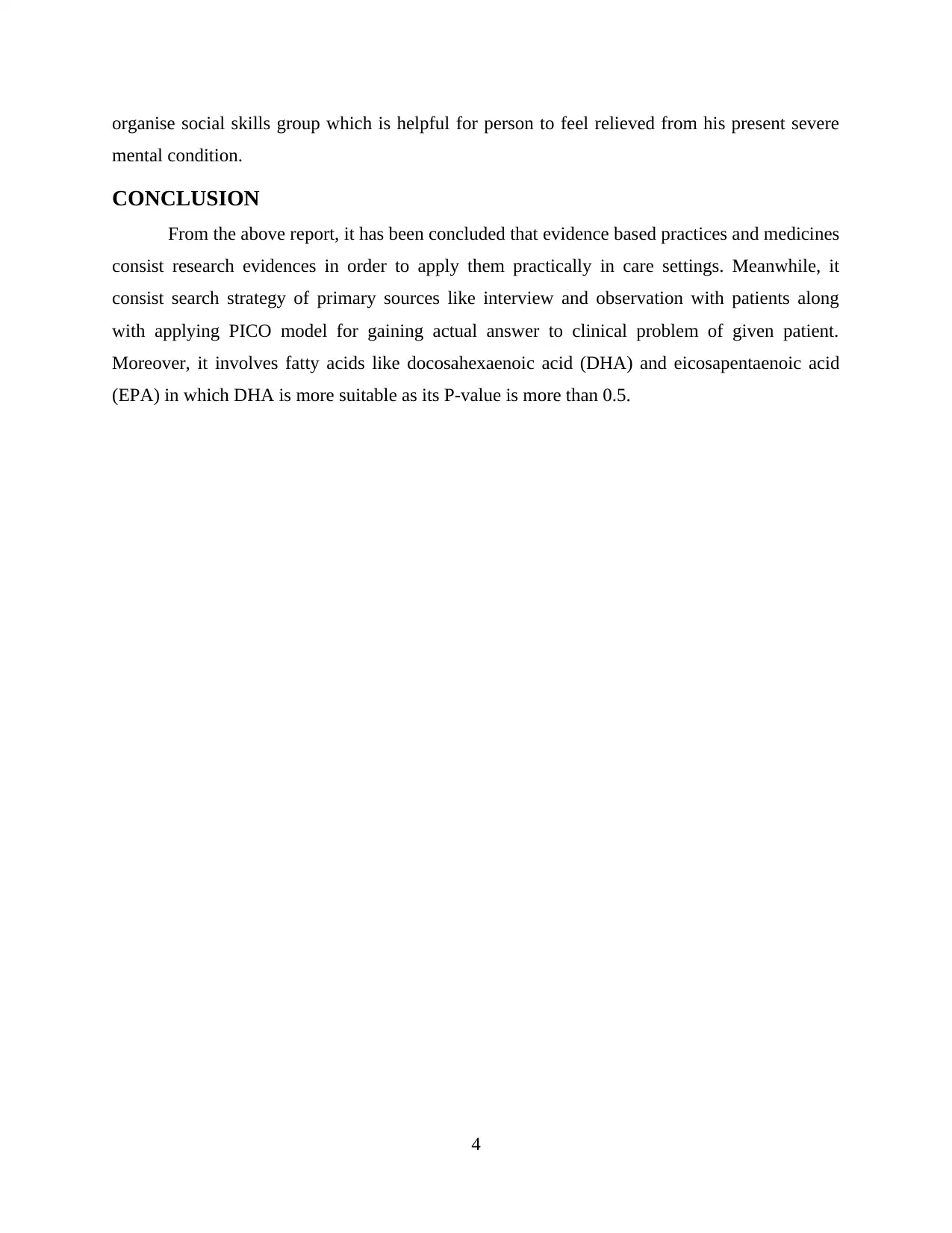
organise social skills group which is helpful for person to feel relieved from his present severe
mental condition.
CONCLUSION
From the above report, it has been concluded that evidence based practices and medicines
consist research evidences in order to apply them practically in care settings. Meanwhile, it
consist search strategy of primary sources like interview and observation with patients along
with applying PICO model for gaining actual answer to clinical problem of given patient.
Moreover, it involves fatty acids like docosahexaenoic acid (DHA) and eicosapentaenoic acid
(EPA) in which DHA is more suitable as its P-value is more than 0.5.
4
mental condition.
CONCLUSION
From the above report, it has been concluded that evidence based practices and medicines
consist research evidences in order to apply them practically in care settings. Meanwhile, it
consist search strategy of primary sources like interview and observation with patients along
with applying PICO model for gaining actual answer to clinical problem of given patient.
Moreover, it involves fatty acids like docosahexaenoic acid (DHA) and eicosapentaenoic acid
(EPA) in which DHA is more suitable as its P-value is more than 0.5.
4
Paraphrase This Document
Need a fresh take? Get an instant paraphrase of this document with our AI Paraphraser
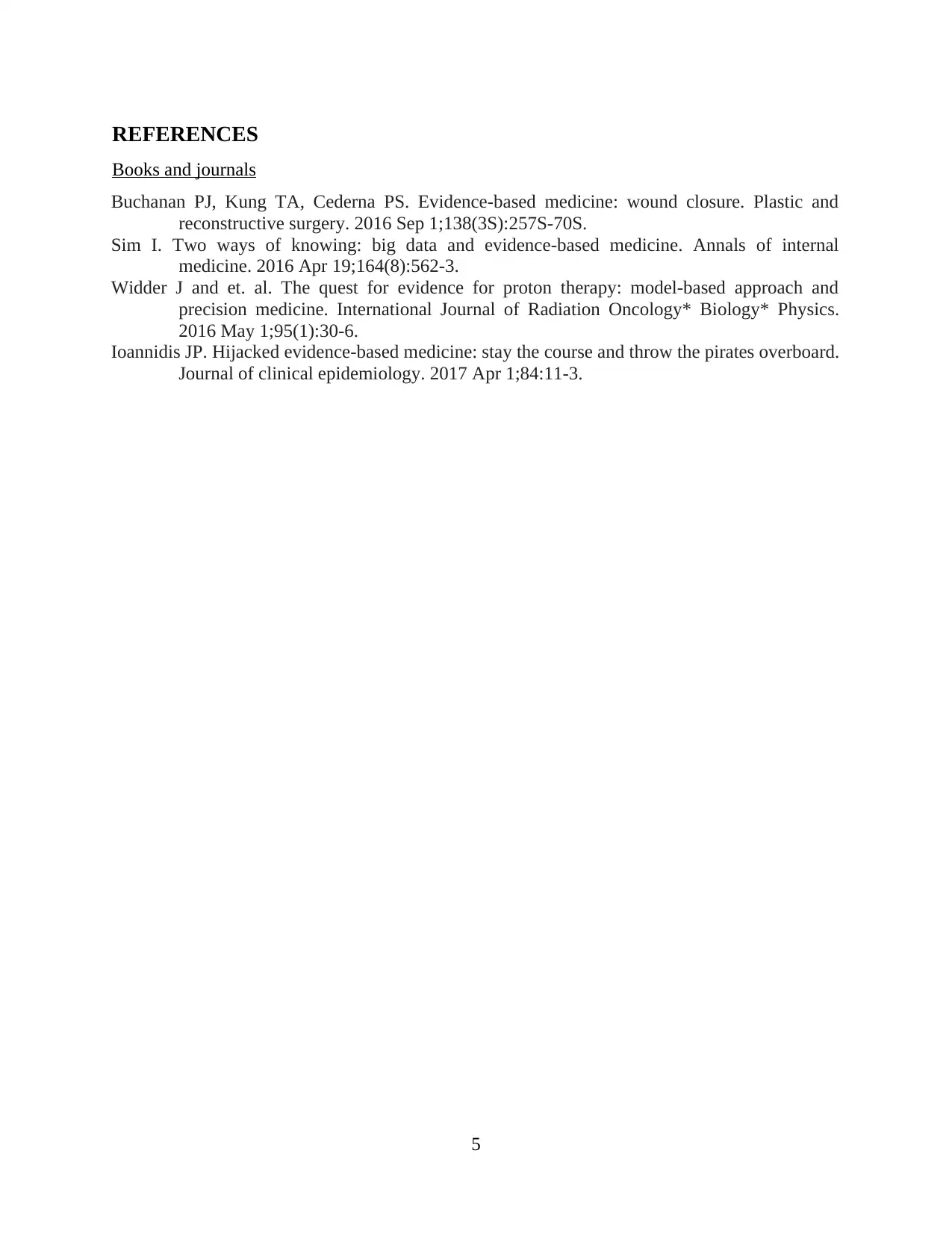
REFERENCES
Books and journals
Buchanan PJ, Kung TA, Cederna PS. Evidence-based medicine: wound closure. Plastic and
reconstructive surgery. 2016 Sep 1;138(3S):257S-70S.
Sim I. Two ways of knowing: big data and evidence-based medicine. Annals of internal
medicine. 2016 Apr 19;164(8):562-3.
Widder J and et. al. The quest for evidence for proton therapy: model-based approach and
precision medicine. International Journal of Radiation Oncology* Biology* Physics.
2016 May 1;95(1):30-6.
Ioannidis JP. Hijacked evidence-based medicine: stay the course and throw the pirates overboard.
Journal of clinical epidemiology. 2017 Apr 1;84:11-3.
5
Books and journals
Buchanan PJ, Kung TA, Cederna PS. Evidence-based medicine: wound closure. Plastic and
reconstructive surgery. 2016 Sep 1;138(3S):257S-70S.
Sim I. Two ways of knowing: big data and evidence-based medicine. Annals of internal
medicine. 2016 Apr 19;164(8):562-3.
Widder J and et. al. The quest for evidence for proton therapy: model-based approach and
precision medicine. International Journal of Radiation Oncology* Biology* Physics.
2016 May 1;95(1):30-6.
Ioannidis JP. Hijacked evidence-based medicine: stay the course and throw the pirates overboard.
Journal of clinical epidemiology. 2017 Apr 1;84:11-3.
5
1 out of 8
Your All-in-One AI-Powered Toolkit for Academic Success.
+13062052269
info@desklib.com
Available 24*7 on WhatsApp / Email
![[object Object]](/_next/static/media/star-bottom.7253800d.svg)
Unlock your academic potential
Copyright © 2020–2026 A2Z Services. All Rights Reserved. Developed and managed by ZUCOL.


